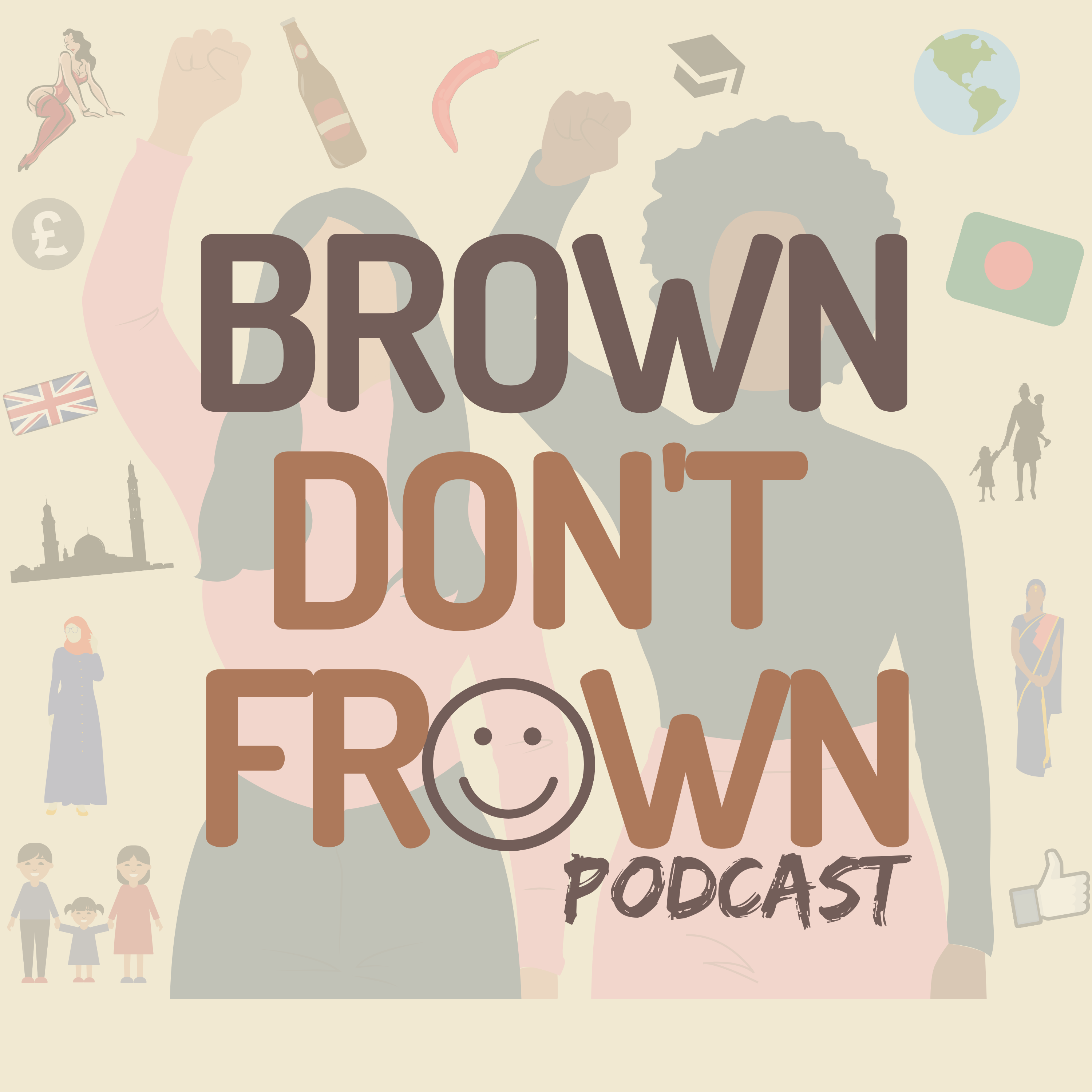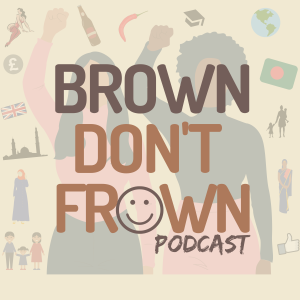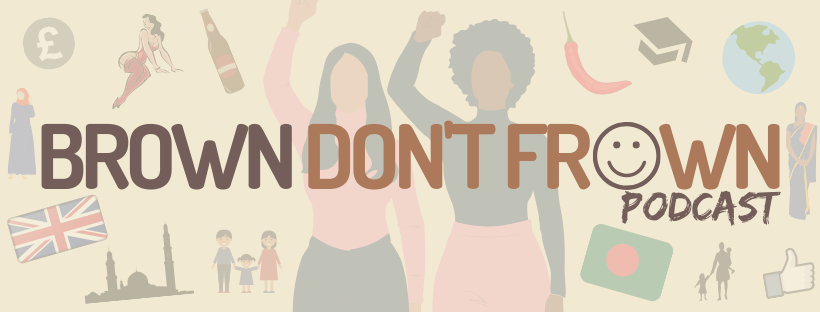
Brown Don't Frown was borne out of a personal journey with womanhood. As a British Bangladeshi, navigating mainstream Feminism often felt exclusionary to me because it didn’t seem to value the experiences or views which shaped my grandmother’s, aunts’, mother’s or friends’ lives. Through this podcast, we seek to build a more inclusive discourse, which breaks down presumptions about different cultures, and shines a positive light on the stories of underrepresented women. Featuring new guest(s) from different walks of life in each episode, Brown Don’t Frown seeks to engage ordinary women and facilitate openness towards entirely new perspectives. It hopes to spark honest and meaningful conversations about intersectional feminist themes in contemporary society with the acknowledgement that our views are shaped by our cultural, racial, religious, social and political experiences. Whether it's discussing society's preconceptions about the Hijab with a British-born Jamaican Muslim woman or examining the impact of gendered expectations on our ability to grieve on our own terms, we hope listeners finish each episode feeling more rounded than they did before. Follow us on: Instagram: https://www.instagram.com/browndontfrownpodcast/ Twitter: https://twitter.com/bdfpodcast?lang=en Facebook: https://www.facebook.com/browndontfrownpodcast LinkedIn: https://www.linkedin.com/company/browndontfrownpodcast
Episodes

Monday Sep 21, 2020

Monday Aug 17, 2020
Monday Aug 17, 2020
This was a live podcast originally broadcast on 13 August 2020 in collaboration with #SouthAsianHeritageMonth.
From Gujuratis in Harrow and Wembley, Punjabis in Southall and Handsworth, Bangladeshis in Tower Hamlets and Pakistanis in Bradford and Sparkhill, South Asians form the fabric of British society, influencing the development of communities, infrastructure and services. In this special episode, Brown Don't Frown and BAME in Property share your housing stories. We unpack the experiences of social housing, community cohesion, financial decision-making, cultural and social mobility, sexism and inter-generational living as told through your voices. Following our discussion, we open up the floor to our audience, where we answer questions and facilitate an interactive discussion.
Continue the conversation by using the hashtags #OurStoriesMatter and #SAHM and tag us on Twitter: @BDFpodcast, @BAMEinProp, Instagram: @browndontfrownpodcast, @bameinproperty and LinkedIn: Brown Don’t Frown podcast, BAME in Property.

Sunday Jul 26, 2020
Season 2: Ep 20 - Reclaiming Sex: Positivity, Pleasure & Power
Sunday Jul 26, 2020
Sunday Jul 26, 2020
In the final episode of season 2, I sit down with Artostry, a spoken-word poet and artist. We examine the implication of necessity rather than pleasure during sex education at school, and how as young girls and women we experienced stigma around openly discussing the female anatomy. The language we use reinforces gender stereotypes around sex which is why embedding neutrality in our communication is integral to sex positivity for women.
Secondly, we discuss pleasure. Why is female masturbation still the most stigmatised aspect of modern sexuality? Why are women still subject to a double standard with casual sex? How do we reclaim our agency when it comes to pleasure?
Thirdly, we consider power. Are men more sexually empowered than women? Do gender norms, such as the notion that men are aggressive and women are submissive, create an uneven power play in sexual relations between men and women? We leave you with some of our thoughts on consent and its definitional challenges.

Sunday Jul 12, 2020
Sunday Jul 12, 2020
Shirin Shah and Sheetal Mistry of South Asian Sisters Speak join me to review Netflix’s ‘Never Have I ever’. What initially emerges as trivial teenage satire quickly becomes a bastion of embracing imperfection.
We talk about the raw portrayal of miscommunication, resentment and high expectations which so often define South Asian mother-daughter relationships. We explore the struggle between tradition, familial expectations and individuality through Kamala’s decision to choose an arranged marriage over her boyfriend. We also discuss the South Asian diaspora’s interrelationship with its various cultures and faiths, and consider the example of the divorcee who was shunned for marrying a Muslim. We discuss whether this type of “infighting” accurately represents the relationship between Hindus and Muslims today.
While representation is about personal experience, we felt there were several missed opportunities which could have challenged these anti-Muslim and arranged marriage stereotypes instead of vindicating them.
Finally, we talk about the side-effects of grief: anger and trauma. Through these themes, ‘Never Have I Ever’ shows us that protagonists can be flawed. They are human, after all.

Sunday Jun 28, 2020
Sunday Jun 28, 2020
Today, Busayo Twins and I discuss white denialism, colourism and the desensitisation of black trauma. Though minorities are grouped under ‘BAME’ for our ‘otherness’, it does not account for cultural, ethnic, religious and racial diversity. Does ‘BAME’ mask our lack of progression against anti-blackness? Busayo also explains why seeing Diversity & Inclusion policies as an ‘add on’ will not enable transformative change.
Black Lives Matter has empowered South Asian communities to challenge the stigma of dark skin. I ask Busayo whether she thinks it will also challenge the colourism faced within black communities and perceptions around skin-tone hierarchy for good.
There is a sense of numbness and desensitisation around black trauma. How can we collectively work together to change that? Does the narrative that only white people have the power to change things legitimise white superiority? Does it take away black people’s agency and undermine black excellence? We conclude that this way of thinking deflects from structural racism. While black people have leverage over their oppression with the power to change some things, black excellence and black struggle are not mutually exclusive. The change must be institutional.

Sunday Jun 14, 2020
Sunday Jun 14, 2020
In part II, Saint Santana, Abi and I pose various questions. How can we educate ourselves to be more tolerant, inclusive and respectful towards transgender and non-binary people? Are gender neutral toilets a distraction? Is the grouping of ‘‘LGBTQ” otherising? Can trans-exclusionary radical feminists be feminists? Are JK Rowling’s tweets transphobic? Should we normalise gender neutral pronouns?
We talk about the delicate balance between mindset, experience and, ultimately, human decency. Even though we might not always understand difference, we can certainly learn to respect it.

Sunday May 31, 2020
Sunday May 31, 2020
In this two part mini-series, I sit down with Saint Santana, who identifies as a trans man, and Abi, who identifies as a bisexual woman. I wanted to facilitate an open discussion around gender, sex, sexuality, and womanhood, firstly, to challenge our ingrained heteronormative societal constructs; and, secondly, because I wanted to address some of my own ignorances.
In part I, we explore the links between gender, sex and sexuality. We discuss self-expression, equity vs equality, double standards, gender norms, sexual freedom, transgender experiences, and bisexuality. Saint sets the scene with his very philosophical take: gender occurs in the brain, sex occurs in the genitals and orientation occurs in the heart...

Sunday May 17, 2020
Sunday May 17, 2020
Is discussing football at work sexist? Should wolf-whistling be illegal?
On today’s episode Lawyer Ellie and I explore ‘Political Correctness' and its interrelationship with Feminism. We posit Feminism as a means of exercising free choice, having opportunity, and - respecting others - a core tenet of political correctness. We talk about the historical significance of political correctness, how it shapes discourse today and whether the current interpretation of it is sustainable in the long-term.
We share our own experiences to help illustrate how at one end, political correctness can be used to manipulate conversation, exacerbate hypersensitivities and polarise views, while at the other end, it can help to build tolerance and inclusivity. Ultimately, we realise that it is about compromise, decency and common sense.

Sunday May 03, 2020
Season 2: Ep 14 - Identity Politics, Intersectionality and Freedom of Speech
Sunday May 03, 2020
Sunday May 03, 2020
Journalist and former Brexit Party parliamentary candidate Inaya Folarin Iman and I sit down over Zoom and ponder over the UK’s current political climate and public accountability during COVID-19. We start off discussing our fixation with identity politics and how to overcome it. I also ask Inaya why she believes in Brexit and whether her experience with the Brexit Party felt any different as a woman of colour.
We reflect on Conservatism and Feminism and ask whether they are mutually exclusive. We talk through the objectives of Intersectional Feminism and examine the tacit hierarchies of morality and ‘victimhood’. We then look at the significance of freedom of speech and its compatibility with truth and lasting peace. In doing so, we recognise that as individuals, we only hold part of the truth and that exchanging contrasting views enables original thinking beyond the political binaries of good vs evil, conservatives vs socialists or oppressor vs oppressed. In the midst of this pandemic, we see how dissent, scrutiny and even partisanship help us to hold our leaders accountable.

Sunday Apr 19, 2020
Season 2: Ep 13 - Do we need a Feminist Foreign Policy?
Sunday Apr 19, 2020
Sunday Apr 19, 2020
What is Foreign Policy? How can it be Feminist? Does it only work for one sex or can it work for everybody? How do the states and institutions which claim to be the proponents of feminist foreign policy ensure it is ethical and inclusive?
Climate Change Journalist Sharlene Gandhi and I examine how feminist foreign policy can be a tool to reshape our conventional thinking: from balancing production and climate change, to the delicacy of trade relations, to the significance of women’s participation in global peace talks, and everything in between. Using Canada and Sweden as examples, we look at the positives and negatives of feminist foreign policies. We also critique how capitalistic ideals have pushed for women’s economic independence without their participation or feedback, or regard for their cultural livelihoods, health and safety, or their children’s well-being.
We advocate an intersectional approach to foreign policy which has regard to the historical structural power relations as well as gender inequality, and one that continually adapts the narrative in line with the world’s rapidly-changing priorities.
